Anti Lock Brakes Come on When Stopping
When the anti-lock brakes come on when stopping, it may indicate a potential issue with the ABS system, such as a sensor malfunction or brake fluid leakage. This can affect the braking performance and should be addressed promptly by a mechanic to ensure safe driving.
Experiencing unexpected activation of the anti-lock brakes while stopping can be both concerning and dangerous. It is important to understand the underlying causes of this issue and take necessary actions to resolve it. We will discuss common reasons why anti-lock brakes may engage unexpectedly and provide insights on how to diagnose and fix the problem.
Stay tuned to learn more about how to troubleshoot and resolve issues with anti-lock brakes coming on when stopping.

Credit: www.cbac.com
How Anti-lock Brakes Work
Anti-lock brakes (ABS) are a critical safety feature in modern vehicles, designed to prevent wheels from locking up during braking, thereby maintaining traction and steering control. Understanding how anti-lock brakes work is essential for drivers to appreciate the technology’s role in enhancing vehicle safety. Let’s delve into the basics of anti-lock brakes and explore their key components in more detail.
The Basics Of Anti-lock Brakes
Anti-lock brakes, commonly known as ABS, work to prevent a vehicle’s wheels from locking during heavy braking, which could otherwise lead to loss of control and skidding. By modulating the brake pressure to each wheel, ABS enables the driver to maintain steering control under hard braking and adverse road conditions. This impressive technology allows the driver to apply maximum braking force while ensuring the wheels keep rotating.
Components Of An Anti-lock Brake System
An anti-lock brake system consists of several interconnected components that work seamlessly to ensure optimal braking performance. These components include sensors that monitor wheel speed, a controller that processes sensor data, hydraulic control unit (HCU) responsible for regulating brake pressure, and anti-lock brake module (ABM) that coordinates the system’s functions. Together, these components form a sophisticated network that empowers ABS to operate effectively, contributing to vehicle safety.
Common Reasons For Anti-lock Brakes Activating
Slippery Road Conditions
Slippery roads due to rain or snow cause loss of traction, leading to the activation of anti-lock brakes.
Brake Sensor Malfunction
When the brake sensor malfunctions, it can send incorrect signals that trigger the anti-lock brake system.
Proper Response When Anti-lock Brakes Come On
When a vehicle equipped with anti-lock brakes comes to a stop, the system may engage and cause the brakes to pulsate. This is a normal response and indicates that the anti-lock brake system is functioning correctly. It is important to maintain steady pressure on the brake pedal and avoid pumping the brakes to allow the system to do its job effectively.
Maintaining Steady Pressure On The Brake Pedal
Anti-lock brakes are designed to prevent skidding by automatically pumping the brakes for you.
When your anti-lock brakes come on, it is crucial to keep your foot steady on the brake pedal.
Avoiding Pumping The Brakes
- One common mistake is pumping the brakes when the ABS activates, which can interfere with its function.
Remember, the best response when your anti-lock brakes come on is to maintain constant pressure on the brake pedal and avoid pumping them.

Credit: en.wikipedia.org
Benefits Of Anti-lock Brakes
The anti-lock braking system (ABS) is a crucial safety feature in modern vehicles, designed to prevent wheels from locking up and skidding during hard braking. This advanced technology offers several benefits that contribute to safer driving experiences and improved vehicle control. Let’s explore the key advantages of anti-lock brakes.
Improved Control And Stability
Anti-lock brakes enable drivers to maintain control over their vehicles during emergency braking situations. By preventing wheel lock-up, ABS allows for steering control, especially on slippery roads or in hazardous conditions. This feature enhances the driver’s ability to maneuver and avoid potential collisions, making it an essential safety asset.
Reduced Stopping Distances
ABS contributes to reduced stopping distances by allowing drivers to apply maximum braking force without the risk of skidding. This results in shorter braking distances, which can be critical in preventing accidents and ensuring the safety of both the driver and others on the road. With ABS, vehicles can come to a controlled stop more efficiently, significantly reducing the risk of collisions.
Maintenance And Troubleshooting Of Anti-lock Brake Systems
Maintenance and troubleshooting of anti-lock brake systems are crucial for ensuring the safety and performance of your vehicle. Anti-lock brakes are designed to prevent your wheels from locking up during sudden stops, providing better control and reducing stopping distances.
Regular Brake Inspections
Regular brake inspections are vital for keeping your anti-lock brake system in optimal condition. The following are important points to consider during inspections:
- Check brake fluid levels and quality regularly, ensuring it is at the recommended level and free of contaminants.
- Inspect brake pads for wear and replace them if the thickness is below the manufacturer’s specifications.
- Examine the brake rotors for signs of damage, such as warping or scoring.
- Inspect brake lines for any leaks, cracks, or signs of wear and tear.
- Ensure proper operation of the brake calipers and pistons.
Dealing With Warning Lights
It’s important to address any warning lights associated with your anti-lock brake system properly. Here’s what you can do:
- If the ABS warning light comes on, it indicates a potential issue with the system. Avoid driving under extreme conditions and have your vehicle inspected by a professional technician as soon as possible.
- If both the ABS and regular brake warning lights illuminate simultaneously, it may indicate a fault in the base brake system. Cease driving and seek immediate assistance.
- In case of intermittent or sporadic ABS warning light illuminations, it could indicate a loose wire connection or a faulty sensor. A thorough inspection is required to identify and rectify the issue.
Remember, it’s essential not to ignore warning lights as they could signify a potential safety concern.
Maintenance Tips
In addition to regular inspections and addressing warning lights, here are some general maintenance tips to keep your anti-lock brake system in optimal condition:
- Follow the manufacturer’s recommended maintenance schedule for your specific vehicle.
- Avoid aggressive driving, as sudden and hard braking can put excessive strain on the system.
- Keep your tires properly inflated and replace them when necessary to ensure optimal traction.
- Regularly clean the brake system components to remove debris and prevent corrosion.
By following these maintenance and troubleshooting tips, you can help ensure the smooth operation of your anti-lock brake system, promoting safety and enhancing the performance of your vehicle.

Credit: www.mobil.com
Frequently Asked Questions Of Anti Lock Brakes Come On When Stopping
Why Does My Abs Keep Activating When I Brake?
Your ABS may be activating when braking due to slippery road conditions or a malfunction in the ABS system. Check the road surface and have the ABS system inspected by a professional to identify the issue and ensure safe braking.
Why Are My Anti-lock Brakes Pulsating When I Stop?
Anti-lock brakes pulsate when stopping due to rapid activation to prevent wheel lock-up, enhancing vehicle control and stability.
What Triggers Anti-lock Brakes?
Anti-lock brakes are triggered by rapid deceleration, wheel slip, or loss of traction. The system activates automatically to prevent skidding and maintain control during sudden stops.
What Should You Do If Your Anti-lock Brakes Come On?
If your anti-lock brakes come on, keep steady pressure on the brake pedal and steer in the intended direction. Avoid pumping the brakes. Allow the system to do its job and maintain control of the vehicle until you come to a complete stop.
Why Do The Anti-lock Brakes Come On When Stopping?
The anti-lock braking system (ABS) is designed to prevent the wheels from locking up during braking, ensuring optimal control and stopping distance on slippery surfaces.
Can I Drive With The Anti-lock Brakes Engaged?
Yes, you can continue driving with the ABS engaged, as it’s a safety feature. However, it’s advisable to have your vehicle inspected by a professional to address any potential issues.
How Does The Abs System Work?
The ABS system uses sensors to monitor wheel speed. When a wheel is about to lock up, the ABS modulates brake pressure to that wheel, allowing it to rotate and maintain traction.
Conclusion
Understanding why anti-lock brakes come on when stopping is vital for safe driving. Regular maintenance and being aware of any unusual sounds or sensations can prevent potential issues with the ABS system. It’s crucial to address any problems promptly to ensure the system functions effectively in emergency situations.

